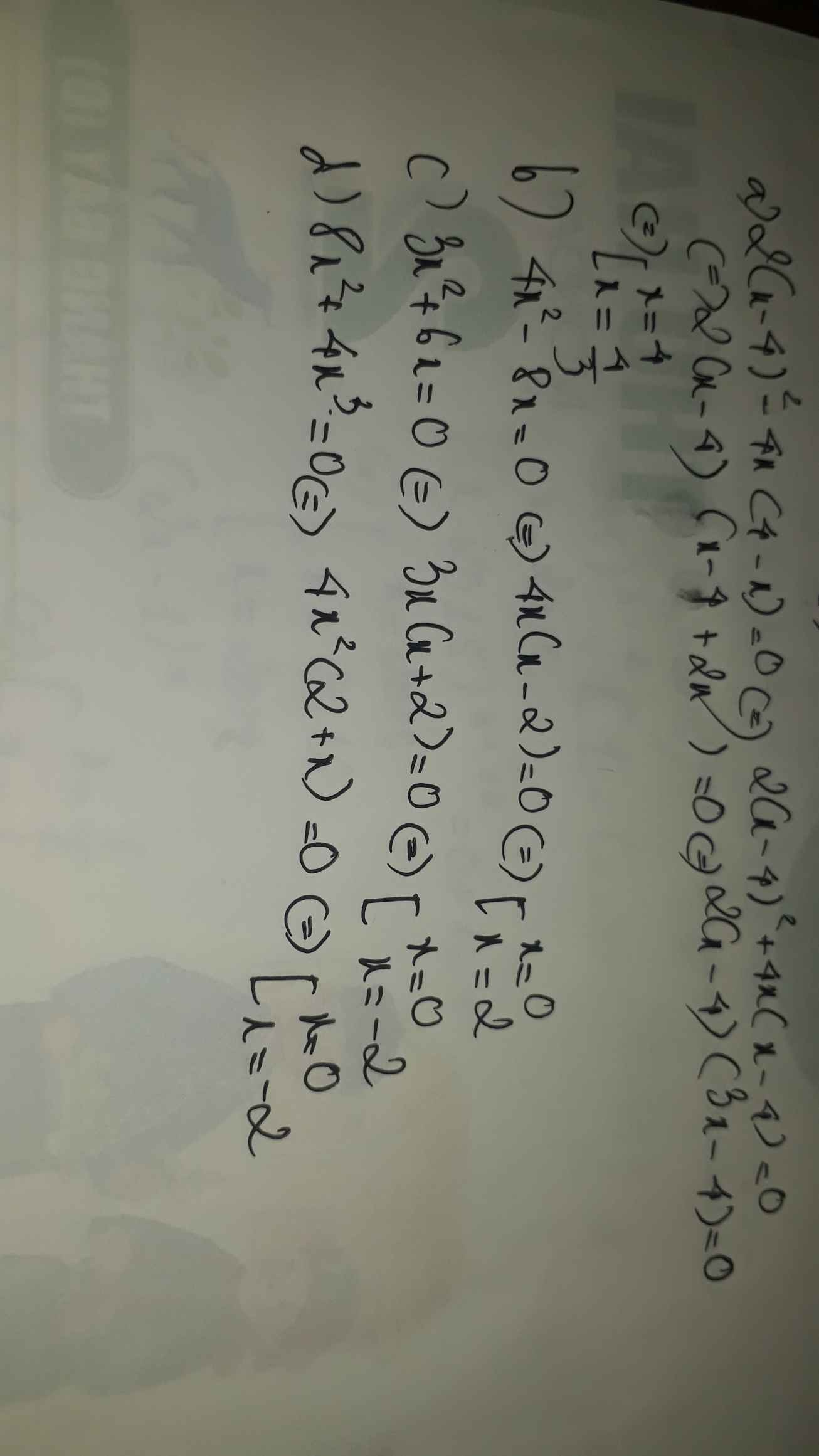x^4+4x^3-8x+5=0

Những câu hỏi liên quan
10x+3/12=1+6:8x/9
2x+7x5 5x+1=0
2x(x-5)-x+5=0
(x+3)^2-(5-x)(x+3)=0
(x+2)(3-4x)=x^2+4x+4
bạn viết rõ đề câu a;b nhé
c, \(2x\left(x-5\right)-\left(x-5\right)=0\Leftrightarrow\left(2x-1\right)\left(x-5\right)=0\Leftrightarrow x=\dfrac{1}{2};x=5\)
d, \(\left(x+3\right)\left(x+3-5+x\right)=0\Leftrightarrow\left(x+3\right)\left(2x-2\right)=0\Leftrightarrow x=-3;x=1\)
e, \(\left(x+2\right)\left(3-4x\right)=\left(x+2\right)^2\Leftrightarrow\left(x+2\right)\left(3-4x-x-2\right)=0\)
\(\Leftrightarrow\left(x+2\right)\left(-5x+1\right)=0\Leftrightarrow x=-2;x=\dfrac{1}{5}\)
Đúng 4
Bình luận (1)
Tìm x
a) x^3 - 16x = 0
b) x^4 - 2x^3 + 10x^2 - 20x = 0
c) (2x - 3 )^2 = (x+5)^2
d) x^2(x-1) - 4x^2 + 8x - 4 = 0
e) x^2 + 4x + 3 = 0
f) x^3 - x^2 = 4x^2 - 8x + 4
g) 2(x+3) - x^2 - 3x = 0
a) x3 - 16x = 0
x(x2 - 16) = 0
=> x = 0 hoặc x2 - 16 = 0
x = 4
Vậy x = 0 hoặc x = 4
b) x4 -2x3 + 10x2 - 20x = 0
x3 (x - 2) + 10x(x - 2) = 0
(x - 2)(x3 + 10x) = 0
=> x - 2 = 0 hoặc x3 + 10x = 0
x = 2 x(x2 + 10) = 0
+ TH1: x = 0
+ TH2: x2 + 10 = 0
x2 = -10 (vô lí)
Vậy x = 2 hoặc x = 0
c) (2x - 3)2 = (x + 5)2
(2x)2 + 2 . 2x . 3 + 32 = x2 + 2.x.5 + 52
4x2 + 12x + 9 = x2 + 10x + 25
4x2 + 12x - x2 - 10x = 25 - 9
3x2 + 2x = 16
x(3x + 2) = 16
Đến đây bạn làm nốt câu c nhé!
Đúng 1
Bình luận (0)
19 Tìm x, biết
a) (x+2)(x+3)-(x-2)(x+5)=0 ; b) (2x+3)(x-4)+(x-5)(x-2)=(3x-5)(x-4)
c) (8-4x)(x+2)+4(x-2)(x+1)=0 ; d) (2x-3)(8x+2)=(4x+1)(4x-1)-3
A. \(\left(x+2\right)\left(x+3\right)-\left(x-2\right)\left(x+5\right)=0\)
\(\Leftrightarrow\left(x^2+3x+2x+6\right)-\left(x^2+5x-2x-10\right)=0\)
\(\Leftrightarrow x^2+3x+2x+6-x^2-5x+2x+10=0\)
\(\Leftrightarrow x^2+3x+2x-x^2-5x+2x=-6-10\)
\(\Leftrightarrow2x=-16\)
\(\Leftrightarrow x=-8\) .Vậy \(S=\left\{-8\right\}\)
B. \(\left(2x+3\right)\left(x-4\right)+\left(x-5\right)\left(x-2\right)=\left(3x+5\right)\left(x-4\right)\)
\(\Leftrightarrow2x^2-8x+3x-12+x^2-2x-5x+10=3x^2-12x+5x-20\)
\(\Leftrightarrow2x^2-8x+3x+x^2-2x-5x-3x^2+12x-5x=12-10-20\)
\(\Leftrightarrow-5x=-18\)
\(\Leftrightarrow x=\dfrac{18}{5}\) . Vậy \(S=\left\{\dfrac{18}{5}\right\}\)
C. \(\left(8-4x\right)\left(x+2\right)+4\left(x-2\right)\left(x+1\right)=0\)
\(\Leftrightarrow8x+16-4x^2-8x+4\left(x^2+x-2x-2\right)=0\)
\(\Leftrightarrow8x+16-4x^2-8x+4x^2+4x-8x-8=0\)
\(\Leftrightarrow8x-4x^2-8x+4x^2+4x-8x=-16+8\)
\(\Leftrightarrow-4x=-8\)
\(\Leftrightarrow x=2\) . Vậy \(S=\left\{2\right\}\)
D. \(\left(2x-3\right)\left(8x+2\right)=\left(4x+1\right)\left(4x-1\right)-3\)
\(\Leftrightarrow16x^2+4x-24x-6=16x^2+1^2-3\)
\(\Leftrightarrow16x^2+4x-24x-16x^2=6+1-3\)
\(\Leftrightarrow-20x=4\)
\(\Leftrightarrow x=-\dfrac{1}{5}\) . Vậy \(S=\left\{-\dfrac{1}{5}\right\}\)
Đúng 0
Bình luận (0)
a)(x+2)(x+3)-(x-2)(x+5)=0
\(\Leftrightarrow x^2+3x+2x+6-x^2-5x+2x+10=0\)
<=>2x=-16
<=>x=-8
b)(2x+3)(x-4)+(x-5)(x-2)=(3x-5)(x-4)
\(\Leftrightarrow2x^2-8x+3x-12+x^2-2x-5x+10=3x^2-12x-5x+20\)
\(\Leftrightarrow3x^2-12x-2=3x^2-17x+20\)
\(\Leftrightarrow5x=22\Leftrightarrow x=\dfrac{22}{5}\)
c)(8-4x)(x+2)+4(x-2)(x+1)=0
\(\Leftrightarrow8x+16-4x^2-8x+4x^2+4x-8x-8=0\)
\(\Leftrightarrow-4x=-8\Leftrightarrow x=2\)
d)(2x-3)(8x+2)=(4x+1)(4x-1)-3
\(\Leftrightarrow16x^2+4x-24x-6=16x^2-4x+4x-1-3\)
\(\Leftrightarrow-20x=-2\Leftrightarrow x=\dfrac{-1}{10}\)
Đúng 0
Bình luận (0)
Giải phương trình:1. x^4-6x^2-12x-802. dfrac{x}{2x^2+4x+1}+dfrac{x}{2x^2-4x+1}dfrac{3}{5}3. x^4-x^3-8x^2+9x-9+left(x^2-x+1right)sqrt{x+9}04. 2x^2.sqrt{-4x^4+4x^2+3}4x^4+15. x^2+4x+3sqrt{dfrac{x}{8}+dfrac{1}{2}}6. left{{}begin{matrix}4x^3+xy^23x-y4xy+y^22end{matrix}right.7. left{{}begin{matrix}sqrt{x^2-3y}left(2x+y+1right)+2x+y-505x^2+y^2+4xy-3y-50end{matrix}right.8. left{{}begin{matrix}sqrt{2x^2+2}+left(x^2+1right)^2+2y-100left(x^2+1right)^2+x^2yleft(y-4right)0end{matrix}right.
Đọc tiếp
Giải phương trình:
1. \(x^4-6x^2-12x-8=0\)
2. \(\dfrac{x}{2x^2+4x+1}+\dfrac{x}{2x^2-4x+1}=\dfrac{3}{5}\)
3. \(x^4-x^3-8x^2+9x-9+\left(x^2-x+1\right)\sqrt{x+9}=0\)
4. \(2x^2.\sqrt{-4x^4+4x^2+3}=4x^4+1\)
5. \(x^2+4x+3=\sqrt{\dfrac{x}{8}+\dfrac{1}{2}}\)
6. \(\left\{{}\begin{matrix}4x^3+xy^2=3x-y\\4xy+y^2=2\end{matrix}\right.\)
7. \(\left\{{}\begin{matrix}\sqrt{x^2-3y}\left(2x+y+1\right)+2x+y-5=0\\5x^2+y^2+4xy-3y-5=0\end{matrix}\right.\)
8. \(\left\{{}\begin{matrix}\sqrt{2x^2+2}+\left(x^2+1\right)^2+2y-10=0\\\left(x^2+1\right)^2+x^2y\left(y-4\right)=0\end{matrix}\right.\)
1.
\(x^4-6x^2-12x-8=0\)
\(\Leftrightarrow x^4-2x^2+1-4x^2-12x-9=0\)
\(\Leftrightarrow\left(x^2-1\right)^2=\left(2x+3\right)^2\)
\(\Leftrightarrow\left[{}\begin{matrix}x^2-1=2x+3\\x^2-1=-2x-3\end{matrix}\right.\)
\(\Leftrightarrow\left[{}\begin{matrix}x^2-2x-4=0\\x^2+2x+2=0\end{matrix}\right.\)
\(\Leftrightarrow x=1\pm\sqrt{5}\)
Đúng 5
Bình luận (0)
3.
ĐK: \(x\ge-9\)
\(x^4-x^3-8x^2+9x-9+\left(x^2-x+1\right)\sqrt{x+9}=0\)
\(\Leftrightarrow\left(x^2-x+1\right)\left(\sqrt{x+9}+x^2-9\right)=0\)
\(\Leftrightarrow\sqrt{x+9}+x^2-9=0\left(1\right)\)
Đặt \(\sqrt{x+9}=t\left(t\ge0\right)\Rightarrow9=t^2-x\)
\(\left(1\right)\Leftrightarrow t+x^2+x-t^2=0\)
\(\Leftrightarrow\left(x+t\right)\left(x-t+1\right)=0\)
\(\Leftrightarrow\left[{}\begin{matrix}x=-t\\x=t-1\end{matrix}\right.\)
\(\Leftrightarrow\left[{}\begin{matrix}x=-\sqrt{x+9}\\x=\sqrt{x+9}-1\end{matrix}\right.\)
\(\Leftrightarrow...\)
Đúng 5
Bình luận (2)
2.
ĐK: \(x\ne\dfrac{2\pm\sqrt{2}}{2};x\ne\dfrac{-2\pm\sqrt{2}}{2}\)
\(\dfrac{x}{2x^2+4x+1}+\dfrac{x}{2x^2-4x+1}=\dfrac{3}{5}\)
\(\Leftrightarrow\dfrac{1}{2x+\dfrac{1}{x}+4}+\dfrac{1}{2x+\dfrac{1}{x}-4}=\dfrac{3}{5}\)
Đặt \(2x+\dfrac{1}{x}+4=a;2x+\dfrac{1}{x}-4=b\left(a,b\ne0\right)\)
\(pt\Leftrightarrow\dfrac{1}{a}+\dfrac{1}{b}=\dfrac{3}{5}\left(1\right)\)
Lại có \(a-b=8\Rightarrow a=b+8\), khi đó:
\(\left(1\right)\Leftrightarrow\dfrac{1}{b+8}+\dfrac{1}{b}=\dfrac{3}{5}\)
\(\Leftrightarrow\dfrac{2b+8}{\left(b+8\right)b}=\dfrac{3}{5}\)
\(\Leftrightarrow10b+40=3\left(b+8\right)b\)
\(\Leftrightarrow\left[{}\begin{matrix}b=2\\b=-\dfrac{20}{3}\end{matrix}\right.\)
TH1: \(b=2\Leftrightarrow...\)
TH2: \(b=-\dfrac{20}{3}\Leftrightarrow...\)
Đúng 3
Bình luận (0)
Xem thêm câu trả lời
giải phương trình sau đặt biến phụ
1) 2x^3+7x^2+7x+2=0
2) x^3-8x^2-8x+1=0
3) x^5+2x^4+4x^2-3x+1=0
4) x^4+x^3+x^2+x+1=0
\(2x^3+7x^2+7x+2=0\)
\(\Leftrightarrow\left(2x^3+4x^2\right)+\left(3x^2+6x\right)+\left(x+2\right)=0\)
\(\Leftrightarrow2x^2\left(x+2\right)+3x\left(x+2\right)+\left(x+2\right)=0\)
\(\Leftrightarrow\left(x+2\right)\left(2x^2+3x+1\right)=0\)
\(\Leftrightarrow\left(x+2\right)\left[2x\left(x+1\right)+\left(x+1\right)\right]=0\)
\(\Leftrightarrow\left(x+2\right)\left(x+1\right)\left(2x+1\right)=0\)
.......................................................................................
\(x^3-8x^2-8x+1=0\)
\(\Leftrightarrow\left(x+1\right)\left(x^2-x+1\right)-8x\left(x+1\right)=0\)
......................................................................................
Đúng 0
Bình luận (0)
Giải pt
(4x-3)^2-(2x+1)^2=0
3x-12-5x×(x-4)=0
(8x+2)×(x^2+5)×(x^2-4)=0
(4x - 3)2 - (2x + 1)2 = 0
\(\Leftrightarrow\) (4x - 3 - 2x - 1)(4x - 3 + 2x + 1) = 0
\(\Leftrightarrow\) (2x - 4)(6x - 2) = 0
\(\Leftrightarrow\) \(\left[{}\begin{matrix}2x-4=0\\6x-2=0\end{matrix}\right.\)
\(\Leftrightarrow\) \(\left[{}\begin{matrix}2x=4\\6x=2\end{matrix}\right.\)
\(\Leftrightarrow\) \(\left[{}\begin{matrix}x=2\\x=\dfrac{1}{3}\end{matrix}\right.\)
Vậy ...
3x - 12 - 5x(x - 4) = 0
\(\Leftrightarrow\) 3x - 12 - 5x2 + 20x = 0
\(\Leftrightarrow\) -5x2 + 23x - 12 = 0
\(\Leftrightarrow\) 5x2 - 23x + 12 = 0
\(\Leftrightarrow\) 5x2 - 20x - 3x + 12 = 0
\(\Leftrightarrow\) 5x(x - 4) - 3(x - 4) = 0
\(\Leftrightarrow\) (x - 4)(5x - 3) = 0
\(\Leftrightarrow\) \(\left[{}\begin{matrix}x-4=0\\5x-3=0\end{matrix}\right.\)
\(\Leftrightarrow\) \(\left[{}\begin{matrix}x=4\\x=\dfrac{3}{5}\end{matrix}\right.\)
Vậy ...
(8x + 2)(x2 + 5)(x2 - 4) = 0
\(\Leftrightarrow\) (8x + 2)(x2 + 5)(x - 2)(x + 2) = 0
Vì x2 \(\ge\) 0 \(\forall\) x nên x2 + 5 > 0 \(\forall\) x
\(\Rightarrow\) (8x + 2)(x - 2)(x + 2) = 0
\(\Leftrightarrow\) \(\left[{}\begin{matrix}8x+2=0\\x-2=0\\x+2=0\end{matrix}\right.\)
\(\Leftrightarrow\) \(\left[{}\begin{matrix}x=\dfrac{-1}{4}\\x=2\\x=-2\end{matrix}\right.\)
Vậy ...
Chúc bn học tốt!
Đúng 0
Bình luận (0)
a) Ta có: \(\left(4x-3\right)^2-\left(2x+1\right)^2=0\)
\(\Leftrightarrow\left(4x-3-2x-1\right)\left(4x-3+2x+1\right)=0\)
\(\Leftrightarrow\left(2x-4\right)\left(6x-2\right)=0\)
\(\Leftrightarrow\left[{}\begin{matrix}2x-4=0\\6x-2=0\end{matrix}\right.\Leftrightarrow\left[{}\begin{matrix}2x=4\\6x=2\end{matrix}\right.\Leftrightarrow\left[{}\begin{matrix}x=2\\x=\dfrac{1}{3}\end{matrix}\right.\)
Vậy: \(S=\left\{2;\dfrac{1}{3}\right\}\)
b) Ta có: \(3x-12-5x\left(x-4\right)=0\)
\(\Leftrightarrow3\left(x-4\right)-5x\left(x-4\right)=0\)
\(\Leftrightarrow\left(x-4\right)\left(3-5x\right)=0\)
\(\Leftrightarrow\left[{}\begin{matrix}x-4=0\\3-5x=0\end{matrix}\right.\Leftrightarrow\left[{}\begin{matrix}x=4\\5x=3\end{matrix}\right.\Leftrightarrow\left[{}\begin{matrix}x=4\\x=\dfrac{3}{5}\end{matrix}\right.\)
Vậy: \(S=\left\{4;\dfrac{3}{5}\right\}\)
c) Ta có: \(\left(8x+2\right)\left(x^2+5\right)\left(x^2-4\right)=0\)
\(\Leftrightarrow2\left(4x+1\right)\left(x^2+5\right)\left(x-2\right)\left(x+2\right)=0\)
mà \(2>0\)
và \(x^2+5>0\forall x\)
nên \(\left(4x+1\right)\left(x-2\right)\left(x+2\right)=0\)
\(\Leftrightarrow\left[{}\begin{matrix}4x+1=0\\x-2=0\\x+2=0\end{matrix}\right.\Leftrightarrow\left[{}\begin{matrix}4x=-1\\x=2\\x=-2\end{matrix}\right.\Leftrightarrow\left[{}\begin{matrix}x=-\dfrac{1}{4}\\x=2\\x=-2\end{matrix}\right.\)
Vậy: \(S=\left\{-\dfrac{1}{4};2;-2\right\}\)
Đúng 1
Bình luận (0)
a)2(x-4)^2-4x(4-x)=0
b)4x^2-8x=0
c)3x^2+6x=0
d)8x^2+4x^3=0
\(a,< =>2\left(x-4\right)^2+4x\left(x-4\right)=0< =>\left(x-4\right)\left(2x-8+4x\right)=0\)\(< =>\left(x-4\right)\left(6x-8\right)=0< =>\left[{}\begin{matrix}x=4\\x=\dfrac{4}{3}\end{matrix}\right.\)
b,\(< =>4x\left(x-2\right)=0< =>\left[{}\begin{matrix}x=0\\x=2\end{matrix}\right.\)
c,\(< =>3x\left(x+2\right)=0< =>\left[{}\begin{matrix}x=0\\x=-2\end{matrix}\right.\)
d,\(< =>4x^2\left(2+x\right)=0< =>\left[{}\begin{matrix}x=0\\x=-2\end{matrix}\right.\)
Đúng 0
Bình luận (1)
1) (x^3 - x^2)- 4x^2 + 8x - 4 = 0
2) 2x^3 - 50x = 0
3) (x + 1) = ( x + 1)(x - 1)
4) ( 3x+1)^2-4(X-3)^2=0
5)(X+3)(X^2-5X+9)-X^3=2X
6) (4X+3)^2-(4X-3)^2-5X-2=0
7)(X-1)^3-(X-3)(X^2+3X+9)-3X(2-X)=5
\(2x^3-50x=0\)
<=> \(2x\left(x^2-25\right)=0\)
<=> \(2x\left(x-5\right)\left(x+5\right)=0\)
đến đây
bạn tự giải nhé
hk tốt
Đúng 0
Bình luận (0)
Giải các bất phương trình sau:
a) \(2{x^2} + 3x + 1 \ge 0\)
b) \( - 3{x^2} + x + 1 > 0\)
c) \(4{x^2} + 4x + 1 \ge 0\)
d) \( - 16{x^2} + 8x - 1 < 0\)
e) \(2{x^2} + x + 3 < 0\)
g) \( - 3{x^2} + 4x - 5 < 0\)
a) \(2{x^2} + 3x + 1 \ge 0\)
Tam thức bậc hai \(f\left( x \right) = 2{x^2} + 3x + 1\) có 2 nghiệm phân biệt \(x = - 1,x = \frac{{ - 1}}{2}\)
hệ số \(a = 2 > 0\)
Ta có bảng xét dấu f(x) như sau:

Từ bảng xét dấu ta thấy \(f\left( x \right) \ge 0 \Leftrightarrow \left[ \begin{array}{l}x \le - 1\\x \ge - \frac{1}{2}\end{array} \right.\)
Vậy tập nghiệm của bất phương trình là \(\left( { - \infty ; - 1} \right] \cup \left[ { - \frac{1}{2}; + \infty } \right)\)
b) \( - 3{x^2} + x + 1 > 0\)
Tam thức bậc hai \(f\left( x \right) = - 3{x^2} + x + 1\) có 2 nghiệm phân biệt \(x = \frac{{1 - \sqrt {13} }}{6},x = \frac{{1 + \sqrt {13} }}{6}\)
Hệ số \(a = - 3 < 0\)
Ta có bảng xét dấu f(x) như sau:

Từ bảng xét dấu ta thấy \(f\left( x \right) > 0\)\( \Leftrightarrow \frac{{1 - \sqrt {13} }}{6} < x < \frac{{1 + \sqrt {13} }}{6}\)
Vậy tập nghiệm của bất phương trình là \(\left( {\frac{{1 - \sqrt {13} }}{6};\frac{{1 + \sqrt {13} }}{6}} \right)\)
c) \(4{x^2} + 4x + 1 \ge 0\)
Tam thức bậc hai \(f\left( x \right) = 4{x^2} + 4x + 1\) có nghiệm duy nhất \(x = \frac{{ - 1}}{2}\)
hệ số \(a = 4 > 0\)
Ta có bảng xét dấu f(x) như sau:

Từ bảng xét dấu ta thấy \(f\left( x \right) \ge 0 \Leftrightarrow x \in \mathbb{R}\)
Vậy tập nghiệm của bất phương trình là \(\mathbb{R}\)
d) \( - 16{x^2} + 8x - 1 < 0\)
Tam thức bậc hai \(f\left( x \right) = - 16{x^2} + 8x - 1\) có nghiệm duy nhất \(x = \frac{1}{4}\)
hệ số \(a = - 16 < 0\)
Ta có bảng xét dấu f(x) như sau:

Từ bảng xét dấu ta thấy \(f\left( x \right) < 0 \Leftrightarrow x \ne \frac{1}{4}\)
Vậy tập nghiệm của bất phương trình là \(\mathbb{R}\backslash \left\{ {\frac{1}{4}} \right\}\)
e) \(2{x^2} + x + 3 < 0\)
Ta có \(\Delta = {1^2} - 4.2.3 = - 23 < 0\) và có \(a = 2 > 0\)
Sử dụng định lí về dấu của tam thức bậc hai, ta thấy tập hợp những giá trị của x sao cho \(2{x^2} + x + 3\) mang dấu “-” là \(\emptyset \)
Vậy tập nghiệm của bất phương trình \(2{x^2} + x + 3 < 0\) là \(\emptyset \)
g) \( - 3{x^2} + 4x - 5 < 0\)
Tam thức bậc hai \(f\left( x \right) = - 3{x^2} + 4x - 5\) có \(\Delta ' = {2^2} - \left( { - 3} \right).\left( { - 5} \right) = - 11 < 0\) và có \(a = - 3 < 0\)
Sử dụng định lí về dấu của tam thức bậc hai, ta thấy tập hợp những giá trị của x sao cho \( - 3{x^2} + 4x - 5\) mang dấu “-” là \(\mathbb{R}\)
Vậy tập nghiệm của bất phương trình \( - 3{x^2} + 4x - 5 < 0\) là \(\mathbb{R}\)
Đúng 0
Bình luận (0)


























